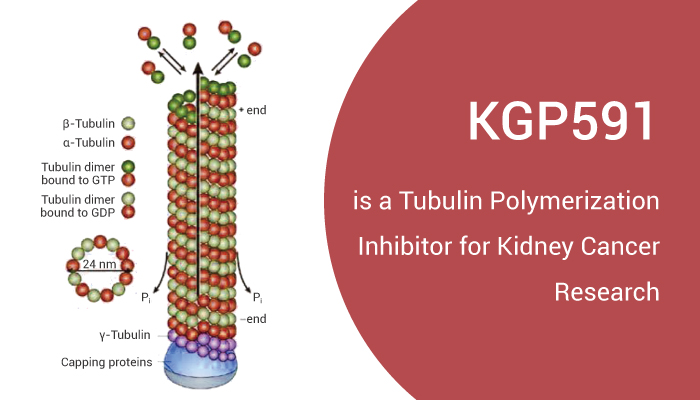Tubulin in molecular biology can refer either to the tubulin protein superfamily of globular proteins, or one of the member proteins of that superfamily. α- and β-tubulins polymerize into microtubules, a major component of the eukaryotic cytoskeleton. Microtubules function in many essential cellular processes, including mitosis. Tubulin-binding drugs kill cancerous cells by inhibiting microtubule dynamics, which are required for DNA segregation and therefore cell division.
In eukaryotes, there are six members of the tubulin superfamily, although not all are present in all species. Both α and β tubulins have a mass of around 50 kDa and are thus in a similar range compared to actin (with a mass of ~42 kDa). In contrast, tubulin polymers (microtubules) tend to be much bigger than actin filaments due to their cylindrical nature.
Tubulin was long thought to be specific to eukaryotes. More recently, however, several prokaryotic proteins have been shown to be related to tubulin.

KGP591 is a Tubulin Polymerization Inhibitor for Kidney Cancer Research
KGP591 is a tubulin polymerization inhibitor with an IC50 value of 0.57 µM. And KGP591 induces significant G2/M stagnation, inhibits cell migration, disrupts microtubule structure and cell morphology in MDA-MB-231 cells. It shows antitumor activity in orthotopic model of kidney cancer (RENCA).
In Vitro, KGP591 (100 nM, 72 h) inhibits migration and proliferation in MDA-MB-231 cells. KGP591 (100 nM, 30 min) induces microtubule disruption in MDA-MB-231 cells. KGP591 (200 nM, 48 h) shows G2/M cell cycle arrest in MDA-MB-231 cells. In Vivo, Phosphate prodrug KGP618 (150 mg/kg, subcutaneous injection, 24 h) for KGP591 shows tumor-selective vascular disrupting agents (VDA) efficacy in BALB/c mice with RENCA-luc xenograft.
In conclusion, KGP591 is a tubulin polymerization inhibitor and has research potential against kidney cancer.
Reference:
[1].Medchemcomm. 2019 Jun 4;10(8):1445-1456.